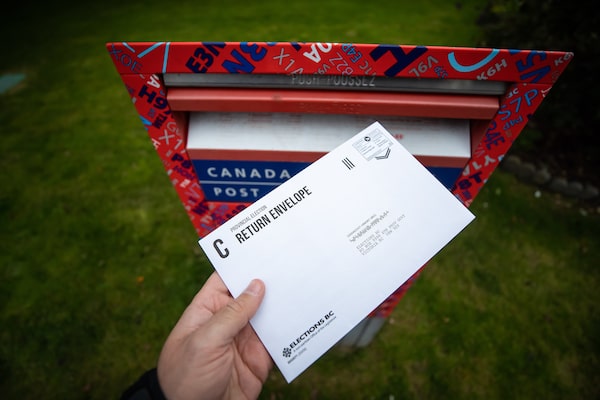
On Oct. 26, staff will begin by counting the 65,000 ballots mailed across the province, starting with Surrey City Centre and Juan De Fuca-Malahat, where the NDP are ahead by 95 and 23 votes.DARRYL DYCK/The Canadian Press
Elections BC received a third more mail-in ballots than it initially estimated and says it will count them this weekend, starting with the two ridings where the incumbent New Democrats hold leads of less than a hundred over the Conservatives.
On Saturday morning, staff will begin by counting the 65,000 ballots mailed across the province, starting with Surrey City Centre and Juan De Fuca-Malahat, where the NDP are ahead by 95 and 23 votes. The mail-in results for the Vancouver suburb are expected that day, but the tally for the riding in the southern tip of Vancouver Island could stretch into the following day, Elections BC spokesperson Andrew Watson said Thursday.
After an initial count of ballots for last Saturday’s provincial election, the NDP were leading or elected in 46 seats, the Conservatives in 45 and the Greens in two. The mail-in ballots will be counted this weekend. That will be followed by a final count Monday of the remaining absentee ballots, which Elections BC says represent about 1 per cent of the total of more than two million votes cast.
If the preliminary results hold, neither the NDP nor the Conservatives will achieve the 47 seats needed for a majority government, and the Greens could once again negotiate with the two parties for the balance of power.
That’s what happened in the 2017 election, when it took two months to sort out who would form government. After intense negotiations, the legislature’s three elected Greens decided to support the NDP government in a deal that gave them official party status, campaign-finance reform and an agreement to work toward changing the electoral system.
The resulting agreement allowed premier John Horgan to form a minority government that lasted for more than three years, before he tore up the deal and called a snap election, where the NDP won a majority.
Stewart Prest, a political science lecturer at the University of British Columbia, said the sizable jump in mail-in ballots this election increases the possibility of Juan De Fuca-Malahat flipping for the Conservatives, but 100 votes in the centre of Surrey might be insurmountable for that party.
He noted that the Green candidate elected last week in West Vancouver-Sea to Sky, Jeremy Valeriote, unsuccessfully ran in the same riding in the 2020 race, where he was ahead by more than 600 votes after the initial count, but ultimately lost by 60 when mail-in ballots were tallied. That loss didn’t alter the election result meaningfully, Dr. Prest said, but did stop the Greens from gaining their first seat on the mainland – until now.
Elections BC did not provide a breakdown of where this year’s 65,000 mail-in votes are spread, but said it would do so Friday.
This weekend, all eyes will be on Juan De Fuca-Malahat, according to Mike McDonald, a partner at the Vancouver-based Kirk and Co. consulting firm, who ran Christy Clark’s successful campaign to become BC Liberal leader and then served as the former premier’s chief of staff.
“This new, enigmatic riding that includes rural communities from Mill Bay to Metchosin to Port Renfrew may well determine whether we have another election next year due to stalemate or whether the NDP, with Green support, finds some space to govern,” said Mr. McDonald, who also co-hosts a provincial politics podcast.
With a report from The Canadian Press